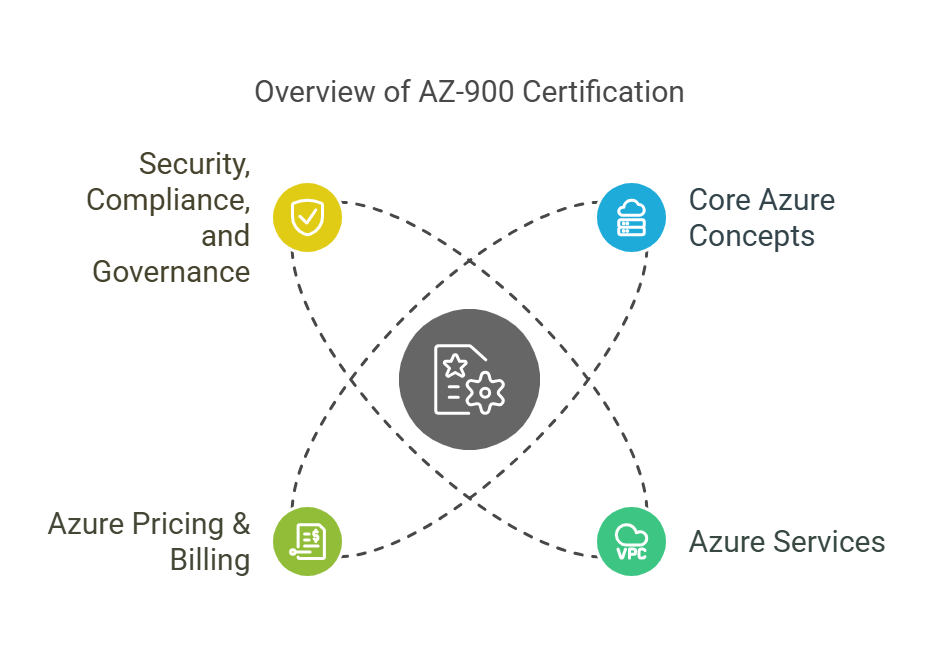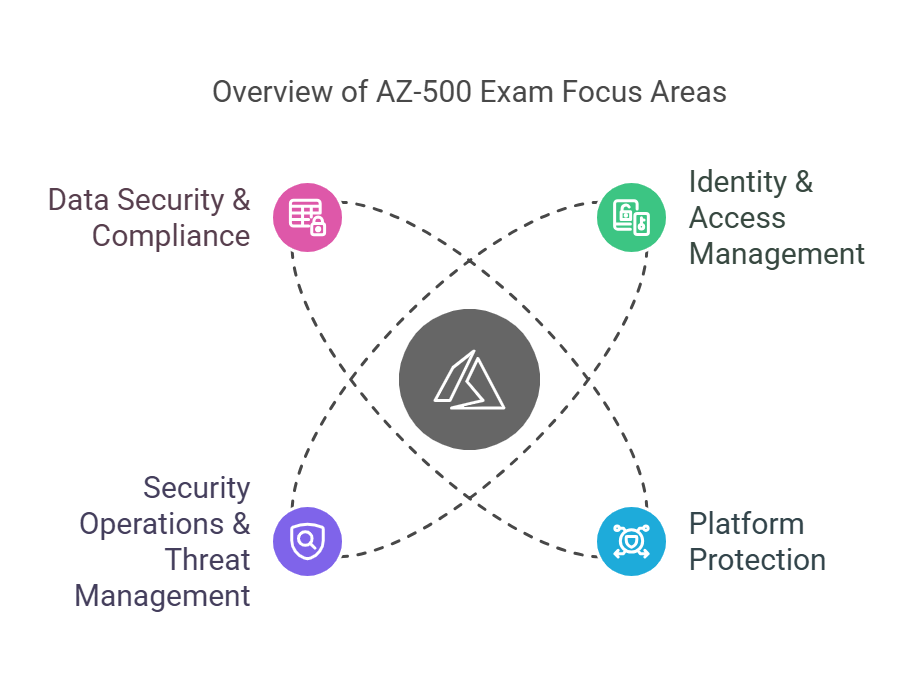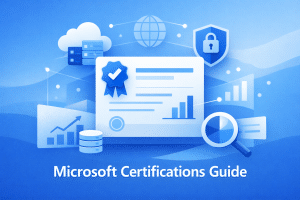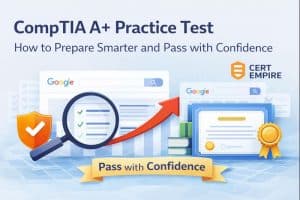Choosing the right Azure certification can be tricky, especially regarding cloud security. If you’re looking at AZ-500 vs AZ-900, you might wonder which suits your career best. Do you start with AZ-900 to build a foundation, or go straight for AZ-500 if you aim for a security-focused role?
The short answer: AZ-900 is great for beginners, while AZ-500 is designed for IT professionals specializing in cloud security. But there’s more to consider, like job opportunities, difficulty levels, and what employers actually look for.
Let’s examine both certifications, compare their benefits, and help you decide which is most appropriate for your goals.
Comparison: Microsoft Azure Certifications
| Category | AZ-500 (Microsoft Azure Security Technologies) | AZ-900 (Microsoft Azure Fundamentals) |
| Target Audience | Security engineers, IT professionals, and administrators focused on securing Azure workloads. | Beginners, non-technical individuals, and those new to cloud computing. |
| Difficulty Level | Advanced | Beginner |
| Exam Focus | Security, compliance, identity management, and threat protection in Azure. | Basic cloud concepts, Azure services, pricing, and support. |
| Prerequisites | Experience with Azure security, networking, and identity management. | No prerequisites; suitable for absolute beginners. |
| Exam Format | 40-60 multiple-choice and performance-based questions. | 30-50 multiple-choice questions. |
| Exam Duration | 120 minutes | 60 minutes |
| Certification Validity | 1 year | No expiration |
| Skills Measured | – Manage identity and access- Implement platform protection- Manage security operations- Secure data and applications | – Understanding cloud concepts- Core Azure services- Security, privacy, compliance, and trust- Azure pricing and support |
| Ideal for Career Path | Cybersecurity professionals, security analysts, cloud security engineers. | IT generalists, business users, students exploring Azure. |
| Cost | $165 USD | $99 USD |
| Exam Provider | Microsoft | Microsoft |
| Renewal Requirement | Yearly renewal assessment | No renewal required |
AZ-900: The Foundation of Azure, Not Just Security
If you’re new to cloud computing or have no prior experience with Microsoft Azure, the AZ-900 certification is your best starting point. It’s designed for absolute beginners, meaning you don’t need a technical background to understand the concepts covered in the exam.
Unlike technical certifications that focus on configuration, troubleshooting, and deep security principles, AZ-900 is all about understanding how Azure works. It doesn’t dive deep into security specifically but gives a broad overview of cloud computing, Microsoft Azure services, and the business side of cloud adoption.
Many people assume that because AZ-900 includes some security topics, it’s a security certification. That’s not entirely true. Security is just one part of the syllabus. The exam focuses more on Azure’s core structure, pricing, services, and cloud models, making it a foundational certification rather than a specialization in security.
Let’s explain exactly what you’ll learn in AZ-900 and why it’s a crucial first step before moving to more advanced Azure certifications like AZ-500.
AZ-900 Is Built for Beginners; No IT Experience Required
One of the best things about AZ-900 is that you don’t need any prior cloud experience to understand the content. If you’re just getting started, our AZ-900 Certification Guide breaks down everything from exam topics to how to study effectively. Unlike other Microsoft certifications that assume you already know Azure, this one starts from scratch.
Who Should Take AZ-900?
- Total beginners who have never worked with Azure before.
- IT professionals looking for a solid cloud infrastructure foundation before jumping into technical roles.
- Non-technical employees like project managers, sales teams, and business analysts who need to understand cloud basics but don’t need hands-on skills.
- Students or fresh graduates planning to build a career in cloud computing.
- Anyone considering a career in cloud security, networking, or development and needs a starting point before going deeper into Azure.
Unlike advanced Azure exams like AZ-104 (Azure Administrator) or AZ-500 (Azure Security Engineer), AZ-900 does not test your ability to configure or troubleshoot anything. The questions are mostly theoretical, with some scenario-based questions that check whether you understand when and why a business might use a specific Azure service.
For a complete breakdown of skills tested, domains, and preparation strategies, see our AZ-500 Certification Azure Security Engineer Guide
What Does AZ-900 Cover?
The AZ-900 certification is structured around four main areas:
- Core Azure Concepts – What is cloud computing? How does Azure work?
- Azure Services – A basic introduction to virtual machines, networking, storage, and databases.
- Azure Pricing & Billing – How businesses manage costs in the cloud.
- Security, Compliance, and Governance – An overview of security tools in Azure.

Let’s go into detail on each one.
1. Core Azure Concepts: The Basics of Cloud Computing
The first thing AZ-900 teaches is what cloud computing actually is. If you’re used to traditional IT setups where businesses own and manage their own physical servers, moving to the cloud might seem confusing.
AZ-900 explains the three main types of cloud computing models:
- Public Cloud – Everything is hosted on Microsoft’s data centers, and you rent only what you need.
- Private Cloud – A business builds its own cloud, which gives them full control but requires a bigger budget.
- Hybrid Cloud – A mix of on-premises servers and public cloud to balance flexibility and security.
You’ll also learn about the three cloud service models that define how Azure is used:
- IaaS (Infrastructure as a Service) – You rent virtual machines, storage, and networking but manage the software yourself.
- PaaS (Platform as a Service) – Azure handles most of the infrastructure, and you just focus on building Microsoft cloud app security.
- SaaS (Software as a Service) – Ready-to-use software like Microsoft 365, Teams, and OneDrive.
2. Azure Services: What Can You Do with Azure?
Once you understand the basics of cloud computing, AZ-900 introduces you to Core Microsoft Azure services. These are the building blocks of any cloud environment.
Compute Services (Processing Power)
- Azure Virtual Machines (VMs) – Like a physical server, but running in the cloud.
- Azure Kubernetes Service (AKS) – Manages and runs containerized applications.
- Azure Functions – A serverless computing solution that runs code without managing a server.
Storage Services
- Azure Blob Storage – Stores large amounts of unstructured data, like images and videos.
- Azure File Storage – Works like a shared network drive in the cloud.
- Azure Disk Storage – Attachable virtual hard disks for VMs.
Networking Services
- Azure Virtual Network (VNet) – Connects cloud resources securely, just like a traditional network.
- Azure Load Balancer – Distributes traffic between multiple VMs to prevent overload.
- VPN Gateway – Allows businesses to connect on-premises networks to Azure securely.
Databases
- Azure SQL Database – A fully managed relational database in the cloud.
- Cosmos DB – A scalable, globally distributed database service.
AZ-900 does not require you to set up or manage these services. Instead, you must understand what they do, when to use them, and why businesses need them.
3. Azure Pricing & Billing: Managing Cloud Costs
Cost management is one of businesses’ biggest concerns when switching to Azure. Since cloud services operate on a pay-as-you-go model, companies need a way to track and control spending.
AZ-900 covers:
- How Azure pricing works – You only pay for what you use.
- Azure Cost Management – A tool for tracking cloud expenses.
- Reserved Instances & Spot Pricing – Ways to save money by prepaying for resources or using spare capacity.
You’ll also learn about Azure Free Tier, which lets you use many services for free for 12 months.
4. Security, Compliance, and Governance: The Basics
Security is a major part of cloud computing, and AZ-900 introduces basic security concepts relevant to Azure.
It covers:
- Azure Active Directory (Azure AD) – Microsoft’s identity management system that controls user access.
- Multi-Factor Authentication (MFA) – An extra layer of security beyond passwords.
- Role-Based Access Control (RBAC) – Restricts what users can do based on their job role.
- Encryption – How Azure protects data at rest (stored data) and in transit (data moving across networks).
- Compliance Frameworks – Azure’s built-in tools for following regulations like GDPR, HIPAA, and ISO 27001.
This section is not as deep as the security focus in AZ-500, but it lays the groundwork for understanding Azure’s security ecosystem.
If you’re planning to tackle this challenging exam, follow our step-by-step AZ-500 exam study tips & prep guide to prepare smarter and boost your chances of passing.
Why Take AZ-900 Before Specializing?
If you’re planning to move into Azure security, administration, or networking, taking AZ-900 first makes sense because:
- It gives you a solid understanding of Azure before diving into complex topics.
- It introduces important concepts in advanced exams like AZ-104, AZ-500, and AZ-305.
- It’s not technical, so you won’t struggle with hands-on configurations.
- It can help non-technical professionals understand Azure if they work with cloud teams.
AZ-500: The Go-To for Security Professionals
Regarding cloud security in Microsoft Azure, the AZ-500 certification is one of the most important certifications for IT professionals looking to specialize in cybersecurity. It’s not an entry-level cert like AZ-900, it’s designed for experienced IT professionals who want to secure Azure environments, manage identity controls, detect threats, and ensure compliance.
Unlike AZ-900, which is theoretical, AZ-500 is deeply hands-on. It tests real-world skills, meaning you must know how to configure, troubleshoot, and manage security across Azure services. If you’re planning to tackle this challenging exam, follow our step-by-step AZ-500 exam study tips and prep guide to prepare smarter and boost your chances of passing.
Why AZ-500 Matters for Security Experts
Security is becoming a top concern as more businesses move to the cloud. Cyber threats are evolving, and companies need skilled professionals to protect data, applications, and networks in Azure.
AZ-500 is important because:
- Cloud security is a major priority for businesses using Azure.
- It proves you can handle security operations, risk management, and compliance.
- Azure security engineers are in high demand, making this cert valuable for career growth.
This cert isn’t for casual learners. It’s meant for IT professionals who already understand networking, identity management, and security principles. If you’re coming from a system admin, network engineer, or security analyst background, AZ-500 is your next step in cloud security.
For more details on career growth and pay scales, explore our job roles and salary insights for AZ-500 certified professionals.
What Does AZ-500 Cover?
The AZ-500 exam focuses on four main areas:
- Identity & Access Management – Controlling who can access Azure resources.
- Platform Protection – Securing networks, virtual machines, and applications.
- Security Operations & Threat Management – Detecting and responding to cyber threats.
- Data Security & Compliance – Protecting sensitive data and meeting regulatory standards.

1. Identity & Access Management: Controlling Who Gets In
One of the biggest security risks in any cloud environment is unauthorized access. Hackers often target weak passwords, unprotected accounts, and misconfigured access settings to break into systems.
What You’ll Learn:
- Azure Active Directory (Azure AD) – The identity management system used in Azure.
- Role-Based Access Control (RBAC) – Restricting access based on job roles.
- Multi-Factor Authentication (MFA) – Adding an extra layer of security beyond passwords.
- Conditional Access Policies – Setting up rules to block risky logins.
- Privileged Identity Management (PIM) – Managing high-level admin permissions securely.
In AZ-500, you won’t just read about these concepts; you’ll need to set them up in Azure, configure policies, and test security settings.
2. Platform Protection: Securing Azure Infrastructure
Once users are inside Azure, the next step is to secure the infrastructure. This means protecting virtual machines, networks, and apps from cyber threats.
What You’ll Learn:
- Firewalls & Network Security Groups (NSGs) – Controlling inbound and outbound traffic.
- DDoS Protection – Preventing Distributed Denial of Service (DDoS) attacks.
- Azure Bastion – Securing remote access to virtual machines.
- Web Application Firewall (WAF) – Protecting web apps from hacking attempts.
- Azure Defender for Cloud – Detecting vulnerabilities in cloud resources.
This section of the exam is very hands-on. You’ll need to configure security policies, test firewall rules, and deploy protection measures to secure Azure workloads.
3. Security Operations & Threat Management: Detecting & Responding to Attacks
A major part of cloud security is monitoring and responding to cyber threats. Security engineers must detect real-time attacks, investigate incidents, and stop threats before they cause damage.
What You’ll Learn:
- Azure Security Center – Monitoring security risks across all Azure resources.
- Microsoft Defender for Cloud – Identifying threats and automating security responses.
- Azure Sentinel (SIEM) – Collecting and analyzing security logs for threat detection.
- Security Automation – Using Azure Logic Apps to automate security workflows.
In AZ-500, you will learn to analyze security alerts, implement security controls and networking and cloud concepts, configure SIEM systems, and automate security responses.
4. Data Security & Compliance: Keeping Data Safe
Every business stores sensitive data, such as customer information, financial records, or business secrets. Azure security engineers must ensure that data is encrypted, access is controlled, and compliance rules are followed.
What You’ll Learn:
- Data Encryption (At Rest & In Transit) – Protecting stored and moving data.
- Azure Key Vault – Securely storing encryption keys and secrets.
- Data Loss Prevention (DLP) – Preventing accidental data leaks.
- Regulatory Compliance – Meeting standards like GDPR, ISO 27001, HIPAA.
- Audit Logs & Security Reports – Keeping track of security activities for compliance.
This part of the exam tests your ability to protect sensitive data, apply compliance policies, and prevent unauthorized access.
How Hard Are These Exams?
Choosing between AZ-900 and AZ-500 isn’t just about picking what sounds good; it’s also about how difficult the exams are. Let’s be clear: these two exams are on completely different levels regarding complexity, preparation, and the kind of experience you need.
AZ-900: Entry-Level, Beginner-Friendly, and No Prerequisites
AZ-900 is designed for absolute beginners. It doesn’t require prior knowledge of Azure, cloud computing, or security. You don’t need IT experience and won’t be expected to configure or troubleshoot anything technical.
- The questions are mostly multiple-choice with some scenario-based questions.
- You don’t need hands-on experience, just a good understanding of Azure concepts.
- It’s one of the easiest Azure certifications, with a high pass rate.
Since the exam is conceptual rather than technical, it’s approachable for non-technical professionals like business managers, project coordinators, and sales teams who need a broad understanding of Azure. If you study a few weeks, you can pass it without struggling.
AZ-500: Requires Real-World Experience in Security, Tougher Exam
AZ-500, on the other hand, is one of the most challenging Azure certifications because it focuses on hands-on security skills from the professional Microsoft Azure fundamentals course.
- You need practical experience with Azure Security Center, Microsoft Defender for Cloud, Sentinel, firewalls, Azure data encryption methods, Azure data protection mechanisms, and compliance frameworks.
- The questions aren’t just multiple-choice; expect case studies, scenario-based questions, and hands-on labs where you have to configure security settings.
- Unlike AZ-900, memorizing theory won’t help much; you need to understand how to secure Azure environments in real-world situations.
- Many people fail AZ-500 on their first attempt if they don’t have actual security experience.
This exam is not beginner-friendly. You’ll struggle to pass if you don’t know how cloud security and identity management work.
For more details on where this cert can take you, explore the job roles and salary insights for AZ-500 certified professionals.
AZ-500 vs AZ-900 Salary: Does One Pay More?
If you’re getting a certification to boost your salary, you should know how much each one is worth in the job market.
AZ-900: Doesn’t Guarantee High Salaries, It’s a Stepping Stone
Since AZ-900 is an entry-level cert, it doesn’t lead to high-paying jobs on its own. Employers don’t hire people just because they have AZ-900, they expect additional experience or certifications.
Typical job roles where AZ-900 is useful:
- Cloud Sales Specialist ($50,000 – $75,000)
- Technical Support Associate ($45,000 – $70,000)
- Project Manager (Cloud Projects) ($60,000 – $90,000)
While it helps you get your foot in the door onsite networking cloud side, it’s not a cert that will immediately land you a high-paying cloud role. It’s more of a resume booster than a career-defining credential.
AZ-500: Leads to Higher-Paying Security Roles
AZ-500 is a high-value certification because cloud security is in demand. Security professionals with cloud expertise are paid significantly higher than general IT roles.
Typical job roles with AZ-500:
- Azure Security Engineer ($100,000 – $150,000)
- Cloud Security Specialist ($110,000 – $160,000)
- SOC Analyst (Azure) ($90,000 – $130,000)
Security roles in cloud computing are some of the best-paying jobs in IT, and AZ-500 proves you have the skills employers are looking for.
Final Thoughts: Which One Should You Choose?
Go for AZ-900 if you’re a beginner and need a general understanding of Azure. Go for AZ-500 if you want a cybersecurity career and need practical cloud security skills.
If your goal is higher salaries and more job opportunities, AZ-500 is the better choice in the long run. But if you’re just starting out, AZ-900 is a great first step before diving into more advanced certifications. If you’re starting the preparation, Cert Empire exam dumps could be a great place to start, They offer trusted, up-to-date dumps for both AZ-900 and AZ-500 exams.
FAQs (People Also Ask Section)
Do I Need Both AZ-900 and AZ-500?
No, AZ-900 is a beginner-level cert, while AZ-500 is advanced. If you already have IT/security experience, you can skip AZ-900.
Can I Take AZ-500 Without Prior Azure Experience?
It’s possible but not recommended. AZ-500 requires hands-on knowledge of Azure security tools, so prior Azure experience is highly beneficial.
How Long Does It Take to Prepare for AZ-500?
If you have security experience, 3–6 weeks should be enough. If you’re new to cloud security, expect 6–12 weeks with hands-on labs.
Is AZ-500 Worth It for a Cybersecurity Career?
Yes! Cloud security roles are in high demand, and AZ-500 can lead to high-paying jobs like Azure Security Engineer and SOC Analyst.
Will AZ-900 Help Me Get a Job?
AZ-900 alone won’t land a high-paying job, but it’s useful for entry-level IT roles or non-technical professionals working with cloud teams.


























